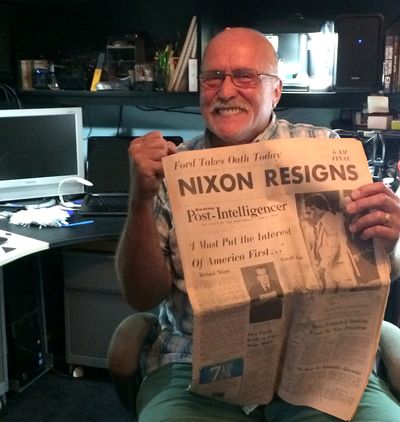This column reflects the opinion of the writer. Learn about the differences between a news story and an opinion column.
Doug Clark: Revisiting Watergate, Richard Nixon’s downfall

Forty years later and Terry Kolemaine still needs to get the Nixon demons out.
“I still gloat,” he said with a chuckle. “After all these years I still love to speak of his demise.”
Lest anyone misconstrue, Kolemaine is referring to Aug. 9, 1974 – the fated day that Watergate-plagued President Richard M. Nixon called it quits – and not to Nixon’s literal demise, which arrived 20 years later.
Kolemaine, 67, invited me to come celebrate the Milhous adios milestone at his south Spokane home.
He also wanted me to examine two yellowed Seattle Post-Intelligencers. Kolemaine has kept the newspapers protected in plastic for the last four decades.
“NIXON RESIGNS,” trumpeted the front-page headline from the P-I of Aug. 9, 1974.
“FORD TAKES OFFICE,” thundered the next day’s edition.
What turbulent times.
When I stalled on his invite, Kolemaine beamed me a photograph showing the dozen-plus guitars that occupy a large part of his basement “man cave.”
Five of the electric guitars, I learned, were built by Kolemaine himself. How impressive is that?
Nixon and guitars.
Offers like that don’t run in herds.
I’m in, I told him. And I’m glad I accepted.
Kolemaine is an energetic, articulate and friendly guy. The Seattle native enjoys playing guitars, kayaking and, much to his surprise, living in Spokane.
Seattle folks tend to “view Spokane as a provincial hole-in-the wall, an ugly stepsister.”
Kolemaine, a retired graphic artist and truck driver, said he changed his tune about Spokane six years ago, when he moved here after marrying his bride, Terry. (That’s right. Same name.)
“I love this city,” he added, “and I want to share that with the world.”
I arrived at Kolemaine’s door on Wednesday morning with two of my prize possessions.
One was my handmade Franklin guitar.
I figured this budding luthier would appreciate such a fine instrument.
The other item was a professionally framed color portrait of Richard Nixon that probably once hung in a post office or a bordello.
I got it from a pal thinking how funny it would be to hang it in the Clark living room and have ol’ Milhous staring at everyone, especially around Christmas.
Sadly, my lovely wife, Sherry, did not share this comic vision.
Even more tragic, she banished Nixon to a place of dusty dishonor up in the attic.
I should correct something. I actually kept Nixon in my truck after I parked and went up to ring Kolemaine’s doorbell.
I wasn’t sure I had the right address and, quite frankly, the last thing I wanted was to confront a confused stranger while holding a large portrait of Richard M. Nixon.
There are many places, I’m quite positive, where that sort of thing will get you shot.
Kolemaine opened the door, thank God.
Soon we were inside and cackling about Tricky Dick like two old buds.
Kolemaine told me he was working at Seattle’s Bon Marche when the big news broke.
“I’m bouncing around like a kid on Christmas morning, saying, ‘He’s gone! He’s gone!’ ”
This over-the-top reaction, he said, hacked off a pro-Nixon customer, which earned Kolemaine a reprimand from his boss.
Maybe it was a generational thing, but there was always something about Nixon that could make your skin flake.
The more facts that slithered out about the creepy crawlies in his administration, the more the president reminded me of a fat, paranoid spider. It’s amazing how fresh it all still seems to those of us who lived through it.
Many young people, of course, have no idea that Nixon’s downfall was the result of a botched 1972 burglary of the headquarters of the Democratic National Committee at the Watergate Hotel and Office Building.
Prize-winning journalism and congressional investigators would reveal that Nixon knew about the burglary and cover-up that followed.
Under pressure from even his fellow Republicans, Nixon bowed out to avoid impeachment (imprisonment?) and was later pardoned by newly sworn President Gerald R. Ford.
“Nixon was beyond contemptible,” said Kolemaine. “He looked the human race right in the eye and said, ‘I am not a crook.’
“I despised him from Day One.”
